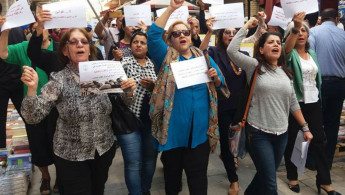A proposed law in Iraq could legalise marriage for children as young as nine
Currently the minimum marriage age in Iraq is 18 years, but can be lowered to 15 in "special circumstances".
Some religious sects in Iraq believe the wife of the prophet Muhammad was aged nine, and say children of that age can marry, while others believe children can do so when they reach puberty.
The draft is seen by many as a political manoeuvre ahead of the upcoming Iraqi elections in May next year, which could potentially put Shia parties in the lead, if they succeed in applying Shia Jaafari interpretation of Islamic law.
But Iraqi women across all sects and ethnicities are campaigning against what they call a flagrant violation and backward step for the rights of girls and women.
"This amendment was tried by Islamic parties in 2014, but it failed miserably because of the strong opposition within the parliament.
"Today, the same parties are returning to parliament, exploiting the security situation of the country and the public's preoccupation with the deteriorating security situation in the north of the country," women's rights activist Zeinab al-Waeli told The New Arab.
The amendment that was proposed in 2014 included other, more extreme, violations of women's rights such as the legalisation of marital rape and the need for permission to leave the house.
Waeli branded the proposed amendment a major disaster for girls and women who could be "bought and sold by clerics and tribal sheikhs".
Read also: Interview: The struggles of being a feminist in the Middle East
She called for international pressure to be put on Baghdad to prevent clerics from dominating the legal authorities In Iraq and the rule of "one-sect jurisprudence".
Women's rights organisation Equality Now says it would see the change as "a complete violation of these girls' human rights and could destroy their lives".
"Iraq must be held to its commitments under international law to end child marriage and not pass this bill," she said.
 |
Iraqi women want more rights, not the questioning [of] the limited ones that exist |  |
Equality Now is working with partners on the ground in Iraq to address the issue and broader women's rights violations in Iraq.
Other amendments to the personal status law could affect women's rights in the country.
The original personal status law grants mothers the right to custody and gives wives the right to inherit their husband's estate, while the religious jurisprudence says the custody of children is a matter for the father and that women do not have the right to inherit real estate or land.
The Iraqi Transnational Collective (ITC), which describes itself as a "grassroots collective of transnational Iraqis with a mission of building community power for political, social and economic justice" has also started a petition to campaign against the amendments.
"Iraqi women want more rights, not the questioning [of] the limited ones that exist," the organisation said.
On November 1, Iraq's council of representatives voted in principle to approve the new amendment, and it has been signed by 40 parliamentarians.
The draft is not yet on the agenda in parliament and the timing of the vote is unclear.


![President Pezeshkian has denounced Israel's attacks on Lebanon [Getty]](/sites/default/files/styles/image_684x385/public/2173482924.jpeg?h=a5f2f23a&itok=q3evVtko)



 Follow the Middle East's top stories in English at The New Arab on Google News
Follow the Middle East's top stories in English at The New Arab on Google News


